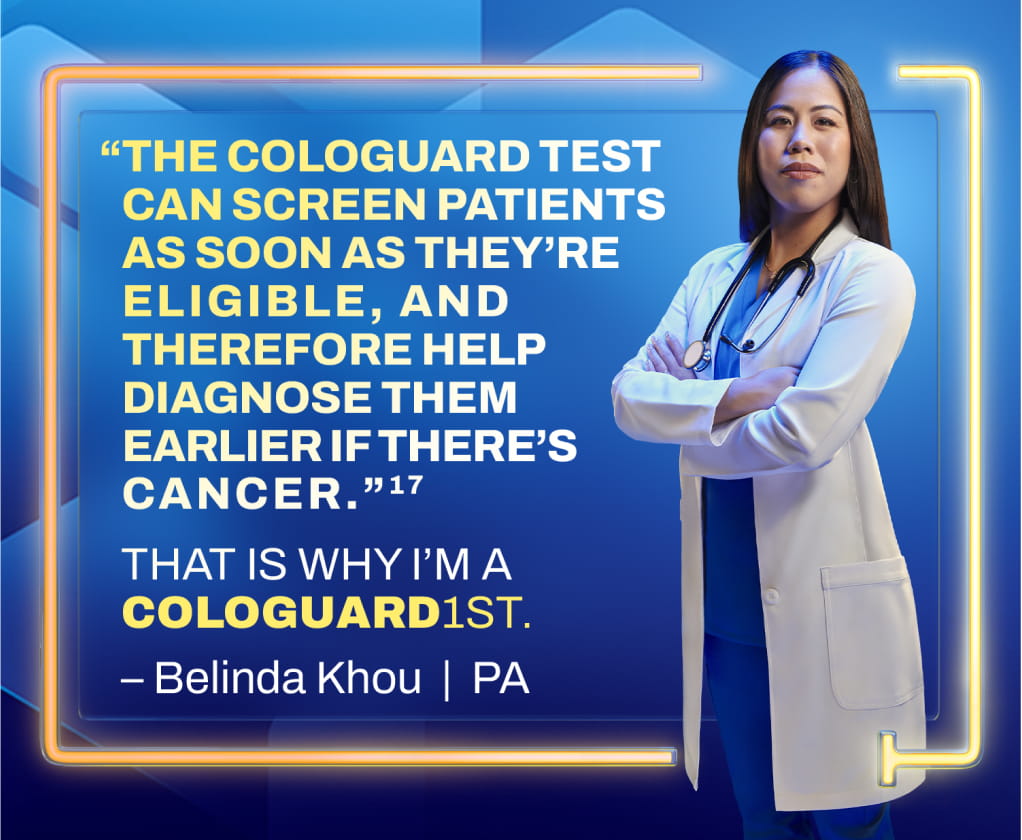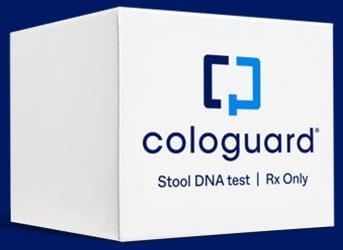Your trusted noninvasive just got better1,4
Based on a subset of 18,911 average-risk patients aged 45-84 years from a prospective, multicenter study.1*
SENSITIVITY & SPECIFICITY
For average-risk patients 45 and older, offering the Cologuard test first can help get more patients screened.1-3
Based on a subset of 18,911 average-risk patients aged 45-84 years from a prospective, multicenter study.1*
95% of adults with CRC tested positive
94% of adults without precancerous polyps or CRC tested negative
Age-weighted to the US population.1
False positives and negatives do occur. Out of every 100 patients testing positive, approximately 3 patients will have CRC, 34 patients will have APLs, 33 will have nonadvanced adenoma, and 30 will have no neoplastic findings. Out of every 100 patients testing negative, approximately 7 patients will be falsely assured that they do not have APLs.
High specificity means fewer unnecessary colonoscopies for your patients.1
100% of adults aged 45-59 years with CRC tested positive
94% of adults aged 45-59 without precancerous polyps or CRC tested negative
All patients who had CRC in this age group received a true positive, with 20/20 cancers detected.1

The Cologuard Plus test may help prevent CRC by detecting precancer and through high patient adherence to follow-up colonoscopy after a positive result1,10-12
Through precancer detection, the Cologuard Plus test is predicted to help reduce the number of CRC cases.1,13,14
Predicted outcomes by the CRC-SPIN model by the USPSTF when adherence for stool DNA testing was assumed at 100%.

Providers have been compensated for sharing their expertise and for acting as consultants for Exact Sciences.
In clinical practice, these patients would not need to undergo a colonoscopy1
With a negative result, there was 99.9% certainty that a patient would not have CRC1**
With a negative result, there was 93.2% certainty that a patient would not have CRC or advanced precancer1 **
Offer the Cologuard Plus test to average-risk patients as defined by the USPSTF and prioritize colonoscopy for those who need it most.1,5
In a 2014, prospective, head-to-head, point-in-time, 90-site, pivotal study of 10,000 patients aged 50 to 84 years at average risk for CRC, the Cologuard test demonstrated2*:
92% of adults with CRC tested positive
94% of adults with early-stage CRC tested positive
87% of adults without CRC and APLs tested negative
90% of adults with negative colonoscopies tested negative
False positives and false negatives did occur in this pivotal study. 13% of patients without CRC or advanced adenomas received a positive result (false positive), and 8% of patients with cancer received a negative result (false negative). The clinical validation study was conducted in patients 50 years of age and older. Cologuard performance in patients ages 45 to 49 years was estimated by subgroup analysis of near-age groups.
Effective detection in a subgroup analysis of adults younger than 60 years.16
100% of adults younger than 60 years with CRC tested positive16
92% of adults aged 50-59 without precancerous polyps to CRC tested negative16
All patients who had CRC in this age group received a true positive, with 7/7 cancers detected.16

Provider has been compensated for sharing their expertise and for acting as a consultant for Exact Sciences.
Consistent screening every 3 years with the Cologuard test can detect CRC and precancer earlier when treatment is most effective.7,9,16

Through precancer detection, the Cologuard test is predicted to help reduce the number of CRC cases.2,13,14
Predicted outcomes by the CRC-SPIN model by the USPSTF when adherence for stool DNA testing was assumed at 100%.
The Cologuard test detected:
In clinical practice, these patients would not need to undergo a colonoscopy2
With a negative result, there was 99.9% certainty that a patient would not have CRC2**
With a negative result, there was 94.8% certainty that a patient would not have CRC or an advanced precancerous lesion2**
Offer the Cologuard test to average-risk patients as defined by the USPSTF and prioritize colonoscopy for those who need it most.2,5
All eligible patients whose insurance covers the Cologuard Plus test will receive it. When you place an order, Exact Sciences will determine which test is covered by a patient’s insurance. If it’s the Cologuard Plus test, that is the test they will receive. If not, they will receive the Cologuard test.
No, the Cologuard test and the Cologuard Plus test are not the same test. They utilize different molecular panels to analyze stool samples for CRC. The Cologuard Plus test utilizes 5 biomarkers including DNA methylation markers and hemoglobin, whereas the Cologuard test utilizes 11 biomarkers including altered DNA and hemoglobin. This new molecular panel was designed to increase specificity without decreasing sensitivity.1,2
However, both the Cologuard and Cologuard Plus tests are ordered the same way, follow the same collection process, and come with the same unparalleled patient support.
There is no head-to-head study that compares these 2 tests, so no conclusions can be drawn about which is more effective. In their respective clinical trials, both tests were shown to effectively detect CRC in comparison to FIT.1,2

Find out how the Cologuard test impacts adherence to CRC screening.
APL=advanced precancerous lesion; CRC-SPIN=Colorectal Cancer Simulated Population model for Incidence and Natural history; FIT=fecal immunochemical test; USPSTF=United States Preventive Services Task Force.